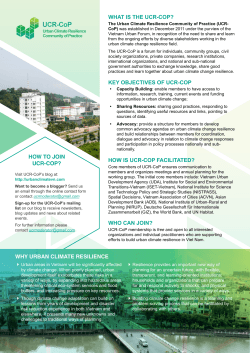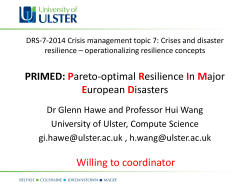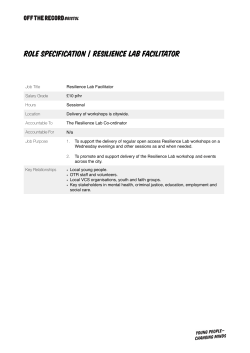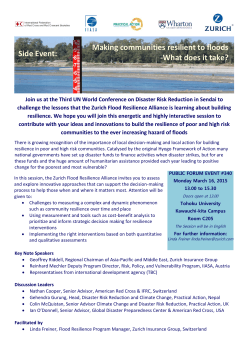
Urban risk and vulnerability assessment tools and approaches
SESSION DESCRIPTION F3 Urban risk and vulnerability assessment tools and approaches Presentations Date: Wednesday, 10 June 2015 Time: 09:00-10:30 Rooms: S34-35 Language: English ICLEI contact: Evgenia Mitroliou Organized by: ICLEI OBJECTIVE Local governments require context-appropriate and reliable methods for conducting risk and vulnerability assessments that will inform their adaptation actions and build public support for resilience measures. This session introduced a variety of models, approaches, and frameworks looking beyond traditional approaches toward a more comprehensive “city resilience assessment”. The session opened with an introduction to a city resilience assessment model based on 130 indicators on disaster and risk exposure that has been applied in Japanese cities. Focusing in on water and sanitation-related risks, the Sustainable Urban Resilient Water for Africa assessment tool was presented. The tool has been piloted in six African cities and relies on a combination of technical and participatory methods. The third presentation went a step further with a framework for resilience monitoring and evaluation that was tested in La Paz, Mexico using an integrated, spatial and temporal assessment methodology. To conclude, Madrid’s experience in developing its Climate Resilient Policy, based on spatial vulnerability screening and integration of vulnerability indicators, highlighted new vision and focus in achieving urban resilience. Existing adaptation assets are incorporated in Madrid’s resilience policy as added value and critical inventory which help enhance mainstreaming in other policies and achieving incremental adaptation benefits. OUTCOMES Participants learned about new methods and frameworks for achieving urban resilience; They explored the value of existing adaptation assets in assessing urban risk and vulnerability and new methods for evaluating resilience spatially; and They were able to take this knowledge with them to apply in their own cities and regions. METHODOLOGY The facilitator provided an overall introduction to the session topic and contributors. (5 minutes) Each presentation was allotted 10 minutes. (4 x 10 minutes) The facilitator managed questions and answers. (40 minutes) Closing remarks by the facilitator. (5 minutes) CONTRIBUTORS Facilitator Nico Tillie, Vice President, World Council on City Data; Researcher / Lecturer, Delft University of Technology; Landscape Architect, City of Rotterdam, the Netherlands Presenter Kenshi Baba, Professor, Center for Regional Research, Hosei University, Tokyo, Japan Developing a policy model for resilient cities: Implications from applying indicators, and developing a status report and scenarios for Japanese cities This presentation introduced a city resilience assessment tool developed by Honsei University. To assess city resilience with this policy model, 130 indicators were developed and an extensive assessment was conducted with local municipalities and the general public in several Japanese cities. A resilient city scenario based on integrated results from the assessment was co-designed by experts and the general public at the Third United Nations World Conference on Disaster Risk Reduction (WCDRR) in March 2015. This presentation summarized the outcomes of the scenario developed at the WCDRR and will inform of the integrated results of the assessment based on 130 indicators. Presenter Tarryn Quayle, Integrated Urban Water Management Professional Officer, ICLEI Africa, Cape Town, South Africa Sustainable Urban Resilient Water for Africa: Developing Local Climate Solutions This presentation introduced a risk assessment conducted as part of the SURe Water 4 Africa project in 6 African cities. This extensive assessment aims at setting a baseline for flood and drought risk and measure urban resilience. The outcomes of the implemented assessment intend to present a road map of how the cities can move from high to low risk with the introduction of interactive maps, participatory planning and identification of indicators that identify community vulnerability to water and sanitation. Presenters Juan Carlos Vargas-Moreno, Principal, GeoAdaptive LLC, Boston, USA Integrated analysis and monitoring of resilience in La Paz, Mexico This presentation outlined the lessons learned through the application of an integrated, spatial and temporal resilience assessment, developed by GeoAdaptive in La Paz, Mexico. The Resilience Evaluation and Planning framework was tested in a project commissioned by the International Community Foundation (ICF) and the InterAmerican Development Bank (IDB), in order to develop a long-term Resilience Strategy to natural hazards and climate change in La Paz. The case of La Paz can be used to inform indicators for monitoring, and methods to assess and plan for increasing resilience and adaptive capacity at the local level. Presenters Efrén Feliu, Climate Change Manager, Tecnalia, Derio, Spain Vulnerability screening and adaptation assets for building climate resilience This presentation introduced Madrid’s climate resilience policy based on a vulnerability spatial screening and the added value of existing adaptation assets. Outcomes from a recently completed climate change vulnerability screening in the city was shared and key selected vulnerability indicators, which will be built into a GIS-based indicators’ system were presented. Madrid’s experience showed how a city with mature climate mitigation policies can capitalize on the knowledge and existing structures to focus on adaptation and resilience planning. Further recommended reading The Africa Water and Sanitation Local Authorities (AWASLA) Network: www.awasla.org
© Copyright 2025










